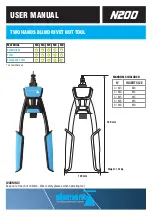
3
For your own safety, read the owner’s manual before operating the hand brake.
This hand brake
is designed and intended for use by properly trained and experienced personnel
only. If you are not familiar with the proper and safe operation of a hand brake, do not use until
proper training and knowledge have been obtained.
1.
KEEP GUARDS IN PLACE
and in working order.
2.
KEEP ALL BODY PARTS AWAY FROM MOVING PARTS.
Avoid placing any part of your body
near belts, cutters, gears, etc.
3.
DO NOT EXCEED RATED CAPACITY
on this hand brake.
4.
KEEP THE WORK AREA CLEAN.
Cluttered areas and work benches invite accidents.
5.
KEEP CHILDREN AWAY.
All visitors should be kept a safe distance from the work area.
6.
MAKE THE WORKSHOP KID PROOF
with padlocks, master switches, or by removing starter keys.
7.
DON’T FORCE THE MACHINE.
It will do the job better and more safely at the rate for which it was
designed.
8.
USE THE RIGHT MACHINE.
Don’t force a machine or attachment to do a job for which it was not
designed.
9.
WEAR PROPER APPAREL.
Do not wear loose clothing, gloves, neckties, rings, bracelets, or other
jewelry which may get caught in moving parts. Non-slip footwear is recommended. Wear protective
hair covering to contain long hair.
10.
ALWAYS USE SAFETY GLASSES.
Also use face or dust masks if the cutting operation is dusty.
Everyday eyeglasses only have impact resistant lenses; they are not safety glasses.
11.
DON’T OVERREACH.
Keep proper footing and balance at all times.
12.
MAINTAIN TOOLS WITH CARE.
Keep tools sharp and clean for the best and safest performance.
Follow instructions for lubricating and changing accessories.
13.
NEVER STAND ON A MACHINE.
Serious injury could occur if the machine is tipped.
14.
CHECK DAMAGED PARTS.
Before further use of the machine, a guard or other part that is
damaged should be carefully checked to determine that it will operate properly and perform its
intended function - check for alignment of moving parts, binding of moving parts, breakage of parts,
mounting, and any other conditions that may affect its operation. A guard or other part that is
damaged should be properly repaired or replaced.
15.
SHEET METAL STOCK HAS SHARP EDGES.
To prevent cuts, use caution when handling.
16.
KEEP HANDS AND FINGERS
clear of the area in front and rear of the brake.
17.
DO NOT USE THE MACHINE
for any purpose other than for which it was designed.
18.
FAILURE TO COMPLY
with all of these warnings may cause serious injury.
19.
SOME DUST CREATED BY
power sanding, sawing, grinding, drilling and other construction
activities contains chemicals known to cause cancer, birth defects or other reproductive harm. Some
examples of these chemicals are:
•
Lead from lead based paint
•
Crystalline silica from bricks and cement and other masonry products, and
•
Arsenic and chromium from chemically-treated lumber.
Your risk from these exposures varies, depending on how often you do this type of work. To reduce
your exposure to these chemicals: work in a well ventilated area, and work with approved safety
equipment, such as those dust masks that are specifically designed to filter out microscopic particles.
20.
DO NOT OPERATE TOOL
while under the influence of drugs, alcohol or any medication.
Summary of Contents for HB-1648H
Page 5: ...5 Breakdown for the HB 1648H HB 2248H Hand Brake...
Page 7: ...7...


























